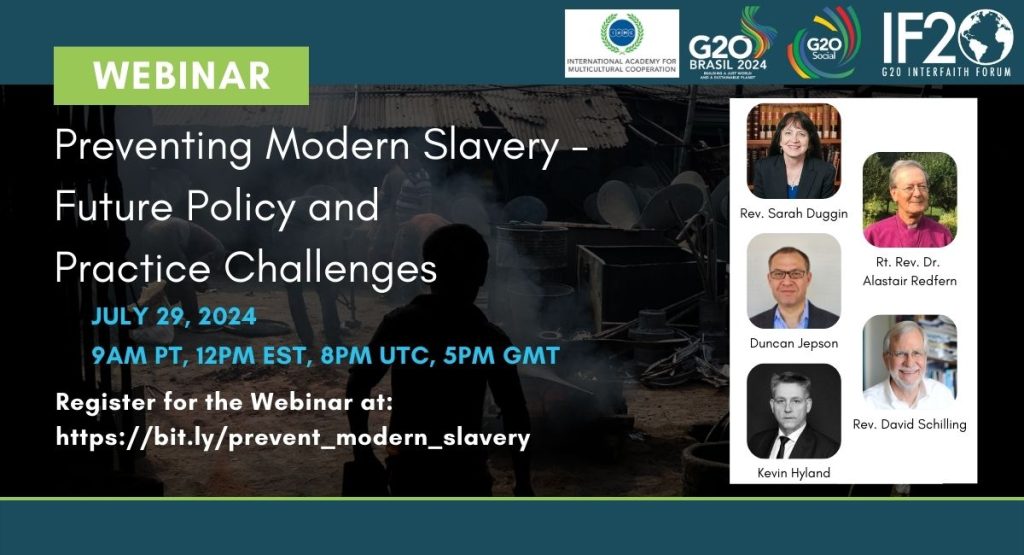By JoAnne Wadsworth, Communications Consultant, G20 Interfaith Forum
— —
On July 29, 2024, the G20 Interfaith Forum hosted a virtual panel discussion entitled “Preventing Modern Slavery – Future Policy and Practice Challenges.” The event brought together experts to explore the complexities of combating human trafficking and modern slavery, reflecting on 25 years since the drafting of the Palermo Protocol and discussing future policy and practice challenges.
Duncan Jepson, former founder of Liberty Shared and recognized for groundbreaking investigations into forced labor in global supply chains, moderated the discussion. The distinguished panel included Kevin Hyland OBE, former UK Independent Anti-Slavery Commissioner, chair of the IF20 Human Trafficking Working Group, and Senior Special Advisor to the Santa Marta Group. With over 30 years of experience in law enforcement, including leading London’s Human Trafficking Unit, Hyland has been at the forefront of global efforts to combat modern slavery and human trafficking.
The Right Reverend Dr. Alastair Redfern, former Bishop of Derby and member of the House of Lords, who played a key role in the passage of the UK Modern Slavery Act 2015, brought his extensive experience in legislative efforts to the discussion. The Reverend Sarah Duggin, Episcopal priest and Associate Professor of Law at The Catholic University of America, offered her expertise in corporate social responsibility and business and human rights. Rounding out the panel was Reverend David Schilling, Senior Advisor at the Interfaith Center on Corporate Responsibility, with extensive experience in engaging corporations on human rights in global supply chains
Jepson opened the webinar by welcoming attendees and highlighting the significance of the topic, given that it’s been 25 years since the drafting of the Palermo protocol. He emphasized the importance of reflecting on both the successes and challenges in preventing modern slavery during this period, and considering future policy and practices.

Kevin Hyland
Hyland framed the purpose of the webinar by highlighting the current state of human trafficking globally. He emphasized the alarming statistics and the urgency of the situation:
“What is startling is that in those legislative frameworks, particularly the 1930 Convention, the 1957 Convention and the 2014 protocol that came in from the ILO (International Labour Organization)… it says ‘as soon as possible’, it talks about urgency, it talks about immediacy of eradicating or dealing with this issue. And a hundred years on, we’re in a position where this crime affects 50 million people worldwide and creates 236 billion US Dollars for criminals.”
Hyland also stressed the need for honest assessment and real action, particularly from the G20 countries:
“We need to start having some honesty. We need to have start having some real deep looks at the policy and the practice. And of course, faith is about honesty. It’s about accepting the truth and looking for ways that we need to change or the way that we need to implement.”
Duncan Jepson
Jepson provided an overview of the challenges and successes in combating human trafficking, using the fishing industry as a case study. He highlighted issues such as understanding the nature of abuse, detection of trafficking on isolated vessels, accountability mechanisms, and structural issues within industries.
He emphasized the importance of both big data and “thick data” – qualitative, on-the-ground information gathered through methods like ethnography:
“We need both big data. And for those people, big data is large quantitative data. But we also need thick data. And thick data is data of people going on the ground, such as ethnography, looking, understanding what is happening, listening to people and understanding what is happening to them from their perspective.”
Reverend Sarah Duggin
Duggin focused on corporate accountability and the evolution of business responsibility frameworks. She discussed the importance of the UN Global Compact, the principles for responsible investment, and the guiding principles on business and human rights:
“The UN Global Compact, the principles for responsible investment and the guiding principles on business and human rights… have had important positive impacts on our understanding of business accountability for forced labor and global supply chains, first by clarifying the responsibilities of government and business with respect to human rights and highlighting the importance of incorporating social and environmental factors into investment decisions.”
She also emphasized the need for more robust accountability measures:
“Financial penalties are not enough. Absent a credible possibility of individual liability… What if CEOs and other senior officers were required to certify human rights disclosures or due diligence certifications?”
Reverend David Schilling
Schilling discussed the importance of engaging various stakeholders in combating human trafficking. He emphasized the need for faith communities and other stakeholders to help companies move beyond “tick box” exercises in addressing labor exploitation:
“The faith community and people that are working on these issues can help companies take the directive and really make sure it’s not a tick box exercise. We’ve been through that with codes of conduct.”
He highlighted the importance of centering survivors’ voices:
“The real experts are the survivors who know more than any of us of what the process has been and then how to address strategy, etc.”
Schilling also discussed the progress made in corporate engagement on human rights issues, citing examples from his work with the Interfaith Center on Corporate Responsibility:
“We’ve been around a long time – 20 years working to get US companies to withdraw from South Africa. That wasn’t our idea. But Desmond Tutu, who was then the secretary of the South African Council of Churches, said ICCR, utilize your leverage with companies to get them to withdraw.”
Reverend Dr. Alastair Redfern
Redfern emphasized the role of faith communities in addressing modern slavery. He stressed that faith can bring people together, but also acknowledged the need for expertise from various sectors:
“Faith can bring people into space. I often say people credit people of faith, that we’re on the side of goodness. Despite all the scandals in our churches, they generally credit that we’re on the side of goodness, but we don’t have the expertise, and we own that. We’re the first people to say we need you lawyers. We need you business people. We need you politicians.”
He also highlighted the importance of consumer awareness and the role of faith in motivating action:
“Quite frankly, what’s driving all kinds of slavery is consumerism, and the consumers are us, all of us. We have moats in our eyes, we have it in our phones, and all that kind of connection with slavery.”

Kevin Hyland (Closing Remarks)
Hyland concluded the webinar by outlining six key areas for action: government procurement, business accountability, addressing tainted money, technology regulation, engaging international agencies, and ethical leadership. He introduced the “30 by 30” initiative:
“I’m introducing the 30 by 30. This is 30 billion by 2030, which is actually on a global issue, quite a small amount… So that as we move forward, we can say we’ve played a major role in defeating this awful crime which affects 50 million people in the world.”
He emphasized the critical role of human kindness in solving this issue:
“We cannot solve this. This is created, as I said, by man and humankind, and it will only be resolved by human kindness.”
Q&A Session
The Q&A session addressed various topics, including the role of ordinary people and faith communities in combating modern slavery, examples of successful models for production without forced labor, and the potential and limitations of AI in addressing human trafficking. Panelists emphasized the importance of consumer awareness, advocating for policy changes, and pooling resources to identify and support companies taking positive action against human trafficking.
Conclusion
The panel discussion highlighted the complex challenges facing the fight against modern slavery and human trafficking. Key takeaways included the need for greater awareness and action from faith communities, improved corporate accountability and transparency, increased funding and political will to combat trafficking, centering survivors’ voices in policy and practice, and addressing consumerism and its role in driving exploitation.
As the world continues to grapple with the issue of modern slavery, the insights and collaborative efforts of religious leaders, policymakers, and corporate actors will be crucial in developing effective strategies for prevention and intervention. The G20 Interfaith Forum’s commitment to this issue, as demonstrated through initiatives like the “30 by 30” campaign, offers hope for meaningful progress in the fight against human trafficking and modern slavery.
— —
JoAnne Wadsworth is a Communications Consultant for the G20 Interfaith Forum Association and Editor of the Viewpoints Blog.


